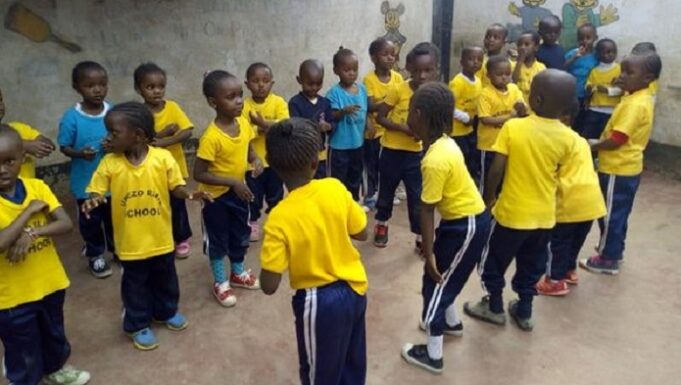How Diploma in Primary Teacher Education Will Prepare Trainees For CBC Implementation
Five core learning areas have been approved under the new Diploma in Primary Teacher Education (DPTE) training, which will form a focal change in delivery of the competency based curriculum, CBC curriculum.
These are professional courses, teacher-support courses, English, Kiswahili or Kenya Sign Language for trainees who are hearing impaired, and physical and health education, as per the Curriculum Designs for Diploma in Primary Teacher Education.
These designs will guide teacher trainers and trainees on how best to deliver quality teaching in line with the requirements of the competency-based curriculum (CBC). The major focus of the CBC is to enlarge learners’ knowledge, experiences and imaginative understanding as well as the development of moral values for life-long learning.
Read also:
CBC Taskforce Recommends Establishement Of Teachers’ Society of Kenya To Regulate Teachers
The New Diploma In Primary Teacher Education (DPTE) Course-Requirements, Intake and application
SRC’s 2021-2025 CBA Shocker For Teachers
SRC’s Take on 2021-2025 CBA Spells A Disappointment To Teachers
SRC Pledges To Bridge Huge Salary Gaps Among Teachers In 2021-2025 CBA
SRC Brings Good News For Teachers in Job Group C3 and Diploma Holders Regarding 2021-2025 CBA
Start Offering CBC Teaching Methodologies With Current Form Four Graduates: Uhuru Urges Universities
Under the new teacher-training plan, a three- year diploma will be the minimum training level for all primary school teachers to achieve quality teaching and learning.
The entry requirements shall be a ‘C’ grade in the Kenya Certificate of Secondary Education examination, or its equivalent as determined by the Kenya National Examinations Council.
The first group of diploma teachers will be admitted to various colleges in May, marking an end to the certificate training programme. The ministry of teducation has already ordered fresh registration of teacher training colleges (TTCs) after it suspended admission to P1 training classes.
“TTCs will ensure that the teacher-trainee receives appropriate training and professional development, which will accord them an opportunity to engage in research,” reads a document from the ministry.
Micro-teaching and practicum in teacher education have been given prominence in order to enhance experiential and reflective learning with support from experienced teachers as mentors.
All teacher-trainees will be undergo the micro-teaching process for three months before proceeding for another six months of practicum.
The one-term session is meant to give the trainees thorough practice before meeting and interacting with learners in a class. Coaching and community practice have also been embedded in the micro-teaching and practicum.
The curriculum has been designed with emphasis on experiential and reflective learning to develop appropriate pedagogical content knowledge; hence the emphasis on integrated content and pedagogy for the student teachers while at college.
“This is to ensure that the teacher-trainee is given adequate time to practice how to facilitate the pupils’ learning of the different strands prescribed in the curriculum designs,” reads document.
Under the new training regime, it is envisaged that the teacher-trainer will guide the teacher-trainee appropriately to embrace the shift from the objective-based learning to the CBC, which is hinged on use of learner-centered methodologies for realization of expected outcomes.
The designs have been organised into seven volumes of professional courses, teacher-support courses, sciences, humanities, creative arts, languages and foreign languages.
Under professional courses, child development and psychology, history of education, sociology of education, curriculum studies, comparative education, inclusive education, and competency-based assessment and instructional leadership and management will be covered.
Communication skills, development and utilisation of learning resources, ICT integration in learning, pertinent and contemporary issues, value-based education, parental empowerment and engagement, community service learning, action research and micro-teaching, and health and nutrition will fall under teacher-support courses.
Mathematics, science and technology, agriculture and home science will fall under sciences whereas social studies, Christian religious education, Islamic religious education and Hindu religious education are listed under humanities.
Creative arts will include physical and health education, music, art and craft while English, Kiswahili and indigenous languages will fall under languages.
German, French, Mandarin and Arabic are listed under foreign languages.
Unlike previously when content was taught separately from methodology, trainees in the diploma course will be taken through an integrated concept of content and pedagogy.
At the end of the training, a teacher should be able to develop and assess the educational competencies required of a learner.
Further details reveal that teacher-trainees will only specialise in three subject areas. They will have to have attained a minimum KCSE Grade of ‘C’ in the learning areas they wish to focus on.
The areas for specialisation have been grouped into four clusters, but teachers will only pick one subject in each category.
Kenya Sign Language, indigenous languages, foreign languages (German, French, Arabic and Mandarin (Chinese) fall under the first cluster.
Mathematics, home science, agriculture, science and technology are cluster two subjects, while social studies, religious education (CRE, HRE, IRE) are listed under cluster three. Cluster four subjects are art and craft, and music.
“Candidates shall specialise from the first year in at least three learning areas preferably from any one of the three clusters,” read the curriculum designs.
Subjects such as English, Kiswahili, and physical health education will be mandatory, but not necessarily specialties.
The three mandatory learning areas will build on the knowledge, skills and attitudes of young teachers for effective lesson delivery.
Those who will be approved to teach in schools will have completed the required hours for coursework and passed the stipulated assessment as directed by the Knec. Trainees will also be needed to have completed the required hours for the practicum.




